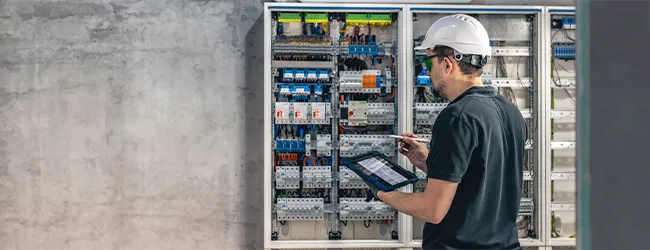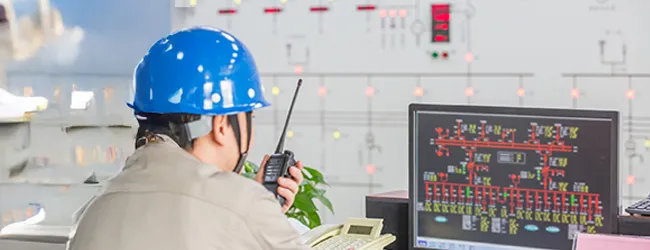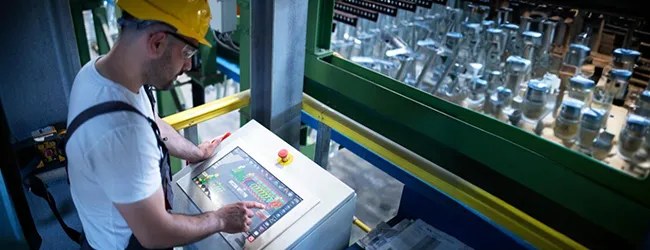The Future of Control Systems: PLC vs DCS vs RTU

Introduction
Automation has emerged as a key factor in raising production, safety, and efficiency in the fast-paced industrial environment of today. Control systems, which are intended to automate, monitor, and regulate a variety of processes, are at the center of this revolution. The PLC control system, DCS control system, and RTU based control system are some of the most popular control systems. The argument between these systems has never been more pertinent as industries continue to develop with increasingly intelligent technologies.
This blog will explore the key differences between these three control systems, helping industries understand which system best suits their needs.
Understanding the Control Systems
PLC (Programmable Logic Controller)
A programmable logic controller (PLC) control system is based on a deterministic operation model that is used to control the electromechanical processes of a system of machines or other equipment. Typically the PLC will receive input from one or more sensors, process that data, then send an output to one or more control devices such as motors, valves, actuators, etc. The popularity of PLC control systems can be attributed to their speed, flexibility, and reliability. PLC control systems are most often used in high-speed manufacturing, packaging, and material handling when the control application requires real time processing for delicate processes. And today PLC has evolved in such a way that PLCs are even applied in Process Control applications with required features along with the speed of operation. Pump/Valve/Engine test stand are application for such requirements.

DCS (Distributed Control System)
A distributed control system (DCS) is an Integrated Control System used to control the complex processes of large-scale industries. In a DCS, the distributed network directly controls the process across multiple controllers. These systems are utilized in many industry verticals such as oil and gas production, Petrochemical complexes, chemical production, and even utilities like power generation. DCS control systems can manage continuous processes specifically; and they provide long-term stability using decentralized control. Moreover, the DCS has the ability to interface with multiple third-party system with multiple options which makes it powerful to use in larger plants involving multiple systems.
RTU (Remote Terminal Unit)
Devices situated in geographically isolated (disparate) locations can be remotely monitored and controlled with an RTU control system. An RTU gathers information from several sensors and devices, processes it, controls if required and forwards it to a central system for monitoring, data logging or additional examination. Applications where field devices are situated far from the central control room, such as Oil wells, Oil rigs, water treatment plants, electrical substations, and pipeline monitoring, frequently use RTU control systems.
Comparative Analysis – PLC vs DCS vs RTU
Control Architecture: Centralized vs Decentralized vs Remote
Centralized Control Systems: These systems are appropriate for small to medium-sized applications (Vertical Plants) because they have a centralized architecture, in which a single controller controls the whole system.
- DCS Control Systems: For increased fault tolerance and scalability, DCS Control Systems use a decentralized architecture that divides control functions among several controllers. This makes them perfect for large-scale, continuous processes.
- RTU Control Systems: These systems function remotely, gathering and transmitting data from field devices to a central system. They are therefore ideal for distributed applications like remote control and monitoring.
Scalability and Flexibility
- PLC control systems are very scalable and flexible, making it simple to expand by adding I/O modules as required.
- DCS Control Systems: incredibly flexible and scalable, able to handle massive volumes of data and regulate intricate procedures. The ability to handle large volumes of analog data.
- RTU Control Systems: Although they are not as scalable as PLCs or DCS, RTU control systems are nevertheless very adaptable when it comes to communication protocols and can manage a large variety of devices.

Real-time Processing and Speed
- DCS Control Systems: Have slower response times due to their focus on process control stability, but they are still appropriate for applications that require continuity of the process, including energy and manufacturing industries.
- RTU Control Systems: Are less common than PLC and DCS systems, and not as fast, but RTU control systems still support highly reliable transmission of data, especially to and from remote or hazardous environments.
Integration with IoT and Industry 4.0
- PLC Control Systems: Can provide seamless connections with IoT devices that allow visibility to real-time data and advanced analytics that are foundational in many businesses pursuing Industry 4.0 applications.
- DCS Control Systems: Have shown significant advancement in their inclusion of IoT and digital technologies for energy management and process optimization as they adopt new features to support predictive maintenance.
- RTU Control Systems: Support communication protocols like MQTT for more simple data exchanges across networks, which is critical for IoT controlled remote monitoring of industrial applications.

Cost and Maintenance Considerations
- PLC Control Systems: Generally less expensive up front and requiring less maintenance, PLC control systems are economical for small to medium-sized applications.
- DCS Control Systems: In companies with extensive continuous operations, DCS control systems provide long-term value while being initially more costly due to their complexity.
- RTU Control Systems: Economical for distant applications, RTU control systems cut operating expenses by eliminating the requirement for on-site staff.
Applications Across Industries
Oil & Gas
DCS control systems in the oil and gas industry manage complex refining processes to ensure process stability. PLC control systems handle specific tasks like controlling pumps or compressors. RTU control systems keep an eye on pipelines and offshore platforms.
Power & Utilities
DCS control systems give power generation plants centralized control over turbines and boilers. PLC control systems control auxiliary systems. RTUs play a key role to monitor substations and transmission lines.
Manufacturing & Process Plants
PLC control systems in manufacturing automate machinery on assembly lines. DCS control systems manage ongoing processes in chemical and food processing industries. RTUs keep track of utilities and other equipment in remote locations.
Smart Infrastructure
RTU control systems in smart infrastructure monitor utilities. PLC control systems run traffic lights, HVAC systems, and building automation. DCS control systems provide centralized control of integrated infrastructure systems.
Choosing the Right Control System for the Future
When selecting the right control system, cost, scalability, operational environment and ease of integration with existing systems are key. Hybrid systems that integrate PLC control systems, DCS control systems, RTU control systems are becoming popular as industries can leverage the strengths of each system.
Also the support and customization provided by control system manufacturers is crucial for the longevity and efficiency of the system.
Leading PLC, DCS, and RTU Manufacturers and Suppliers
In global and Indian markets there are many players in control systems. For industries including oil and gas, chemicals, and pharmaceuticals, Maxima Automation is a reputable brand in India in gas detection systems, providing dependable and sector-specific solutions. Maxima, which is well-known for its high-performance detectors and robust technical support, provides solutions that guarantee safety, real-time monitoring, and smooth integration with current configurations.
When selecting a control system manufacturer look for industry expertise, reliability, after sales support and ability to provide solutions that meet your business needs.
Conclusion
In summary intelligent automation requires knowledge of the differences between PLC, DCS and RTU control systems. Each system has its own advantages and the best option depends on the industry requirements of process complexity, scalability, speed and remote capabilities.
As industries evolve, companies can stay ahead of the curve and achieve efficiency, safety and sustainability in their operations by partnering with control system solution providers like Maxima Automation.